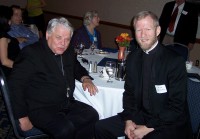September 16, 2009 // Local
Science at the service of life

Bishop John M. D’Arcy joined the noted theologian and neuroscientist, Father Tad Pacholczyk, at the Sept. 11 banquet where Father Pacholczyk spoke on “Science at the Service of Life.”
Father Tad Pacholczyk lectures in South Bend
By Ann Carey
NOTRE DAME — In our technological society, many competing claims are set forth about the correct relationship between science and religion, with some people arguing that science and religion are incompatible.
Father Tad Pacholczyk addressed those claims in a talk here Sept. 11 in which he explained that “Science and religion need each other precisely because they meet in the human person.” As a theologian as well as a scientist with a doctorate in neuroscience, Father Pacholczyk is director of education and a staff ethicist at the National Catholic Bioethics Center. He is an engaging speaker who is able to explain complex issues in simple language, and he lectures and consults widely on bioethics topics.
Father Pacholczyk used a lively slide presentation to talk about “Science at the Service of Life” at a banquet hosted by the diocesan Office of Family Life in McKenna Hall on the University of Notre Dame campus.
He first discussed five common misconceptions about the relationship between science and religion. The claim that science can directly find God, or prove his nonexistence is false, he said, because “God is hidden, nonmaterial and transcendent.” However, scientists can “find” God indirectly as they carry out their research, the priest said, citing several famous scientists who reported that the sciences enabled them to see the power, wisdom and goodness of God.
The second misconception is that supernatural action is a legitimate subject of scientific inquiry. That is false, Father Pacholczyk said, because science is incapable of directly investigating supernatural actions, such as miracles. Supernatural phenomena can be studied only indirectly since they cannot be reproduced and are outside the natural order.
Another misconception is that the scientific method is the only way to acquire truth. Some people are tempted to reduce all ways of knowing to the scientific method because so much has been learned that way, he said. However, this is a materialist view that dismisses the existence of God, divine revelation and a natural grounding in ethics, as well as the concept that humanity can participate in a reality that transcends itself. The domain of science has inherent limitations, he continued, and the failure to grasp that is a “common intellectual error.”
Misconception four is that science can answer all questions, even those about meaning, value, purpose and ethics. And even though science lacks the tools to address the questions of ultimate reality or values, scientists sometimes “pontificate” on matters outside their competence without any grounds for verification, Father Pacholczyk said.
The last misconception the priest discussed was that science and religion should have no overlapping interface because they are distinct realities. Father Pacholczyk disputed that claim, again quoting several famous scientists and theologians.
Father Pacholczyk said that Leon Kass, who was the chairman of President George W. Bush’s Council on Bioethics, summed up this concept perfectly when he said we must raise the ethical questions, for “There may be some things that men should never do. The good things men do can be made complete only by the things they refuse to do.”
This is a “huge challenge” in our technocratically driven society that has the desire to move ahead with science “at full steam and at all costs,” Father Pacholczyk said.
“This issue of ethical blindness in science … or that somehow science can provide its own basis for practices and action, I’m convinced represents one of the greatest dangers to mankind,” he continued.
Father Pacholczyk concluded his talk by showing a slide of a tiny newborn baby being cradled in a man’s large hands.
“I am convinced, ultimately, that the true measure of the greatness of a society will not be in terms of its gross national product or its military might: The true greatness of a society will always be measured in terms of how it treats its weakest members.”
The best news. Delivered to your inbox.
Subscribe to our mailing list today.





